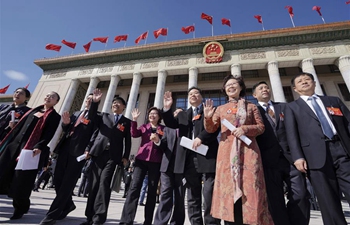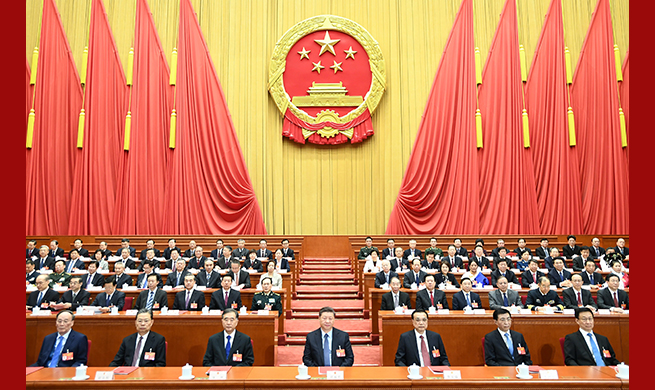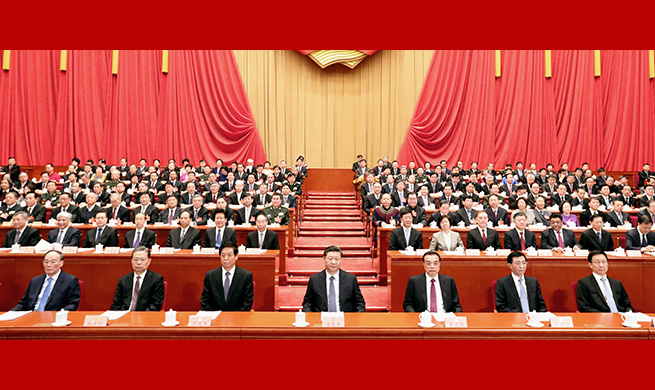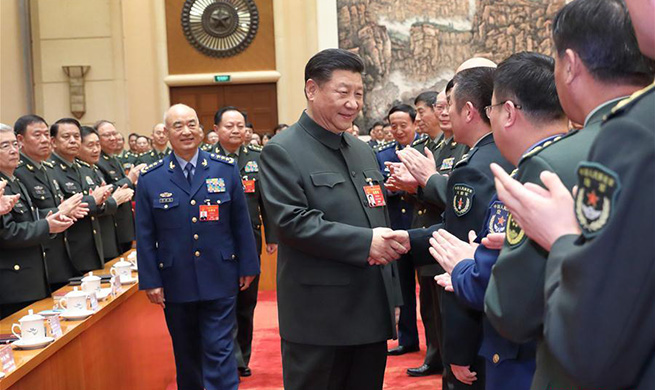by Nick Kolyohin
JERUSALEM, March 15 (Xinhua) -- The Israeli agri-tech sector is expected to help deal with global food security challenge as it is growing fast in technologically innovative areas.
During 2017, the total investment in agri-tech in Israel was 141 million U.S. dollars. Israel is considered to be listed as the top five countries in the global agriculture sector, according to the Israeli government.
In the past decade, the Israeli agri-tech sector has produced a high number of new technologically innovative companies, addressing the global agricultural issues.
Israeli agri-tech industry grows constantly. Over a quarter of the Israeli companies in this filed were founded during the last five years, and half were founded in the last ten years.
Israel's geographical landscape covers semi-arid land, combined with dwindling natural freshwater resources, promoting the need for national agricultural research and development.
As a result, Israel has become a leading country in agriculture.
"There are currently 450 to 500 companies relating to agriculture in Israel," said Michal Levy, a senior deputy director-general at the Israeli Ministry of Agriculture and Rural Development.
Levy runs the agricultural innovation unit whose purpose is to support and promote the Israeli agri-tech companies to thrive and grow, so the farmers and country could benefit from the innovation.
The expertise that is being developed in the agricultural industry is in areas such as robotics, precision agriculture, development of eco-friendly pesticides and herbicides, new animal breeding techniques and much more.
The collaboration between agriculture and robotics can make a real difference in the field. Drones, software, and robots are used more and more in the fields of Israel.
The future vision of the industry is that everything will be linked to smartphones. Future farmers would presumably sit at their homes with digital remotes, controlling everything that is happening in their fields.
Now, the costumers want to know more about the footprint of products they buy and how harmful to the environment and health was the process.
Haim Rabinowitch, a professor at a faculty of agriculture in the Hebrew University of Jerusalem told Xinhua that "Israel strives to develop sustainable pesticides."
Rabinowitch is an expert of plant science and genetics in agriculture, and he sees a future where science and agriculture band together completely.
Israeli scientists closely collaborate with farmers to invent cutting-edge products such as heat-tolerant tomatoes, drought-resistant cucumber seeds, and ultra-efficient drip irrigation.
"Israel already uses its innovative technology to sterilize the soil with solar energy instead of using robust harmful chemicals, before seed crops," said Rabinowitch.
Israeli farmers strive to develop pest-resistant plants to save pesticides use on them, using a breeding technology it is possible to invent much stronger plants.
Israel is a world leader in using desalinated water from the sea. Moreover, almost all of the country's sewage water is used at agriculture after sophisticated recycling process.
Over the years Israel bred new types of vegetables and fruits, which are renowned all around the globe.
"Israel was the first one, and I was lucky to be part of this team, that developed the long-served life tomatoes, and all kinds of sweet peppers that are spread all over the world," Rabinowitch told Xinhua.
Israel also uses its army technological innovation in agriculture, according to Professor Uri Marchaim, head of the department of precision agriculture at MIGAL Galilee Research Institute.
"There is an attempt to use the advanced military technologies that are developed in Israel for agriculture, which is directed by the Ministries' policies," Marchaim said in an interview with Xinhua.
Not less surprising, new approaches are implemented "to measure how the plants 'feel'(having stress), by examining their photosynthesis and flow of electrons," said Marchaim.
Food insecurity and safety, manual labor shortages, and environmental strains are among the most urgent challenges of the food industry.
The world is one generation away from reaching a population of ten billion, and the demand for food is rising proportionately.
Rising income levels in low and middle-income countries are provoking a shift in diet, from inadequate unhealthy to more rich and healthy food like meat, fruits, and vegetables.
Each year the agricultural industry must be more productive and innovative to answer the growing demand for food all around the globe. This is where Israeli agri-tech sector sees its opportunity to grow.
From 2012 to 2016, investment in the global agri-tech sector has increased significantly, from 500 million U.S. dollars to 3.2 billion U.S. dollars, according to the Israeli Ministry of Agriculture and Rural Development.
The global agriculture, forestry, and fishing value market is estimated by the World Bank to be worth 3.352 trillion dollars in 2017. Yet the agri-tech sector is a largely untapped source of business.

















